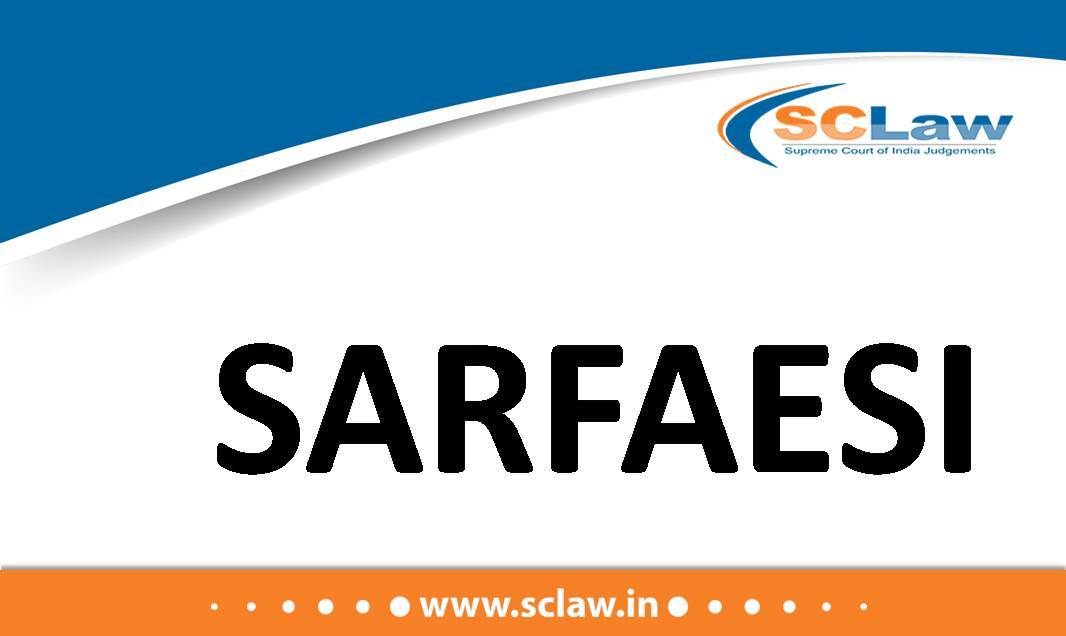Right to Fair Compensation and Transparency in Land Acquisition, Rehabilitation and Resettlement Act, 2013 – Section 24(1)(a) – Under the provisions of Section 24(1)(a) in case the award is not made as on 1-1.2014, the date of commencement of the 2013 Act, there is no lapse of proceedings. Compensation has to be determined under the provision of the 2013 Act.
SUPREME COURT OF INDIA DIVISON BENCH DELHI DEVELOPMENT AUTHORITY — Appellant Vs. SHIV KUMAR AND OTHERS — Respondent ( Before : M.R. Shah and Krishna Murari, JJ. ) Civil Appeal…
Application under Section 14 SARFAESI Act – District Magistrate (DM)/Chief Metropolitan Magistrate (CMM) is not required to adjudicate the dispute between the borrower and the secured creditor and/or between any other third party and the secured creditor with respect to the secured assets.
SUPREME COURT OF INDIA DIVISON BENCH BALKRISHNA RAMA TARLE DEAD THR LRS AND ANOTHER — Appellant Vs. PHOENIX ARC PRIVATE LIMITED AND OTHERS — Respondent ( Before : M.R. Shah…
Service Law – Leave encashment is part of the salary –
SUPREME COURT OF INDIA DIVISON BENCH JAGDISH PRASAD SAINI AND OTHERS — Appellant Vs. STATE OF RAJASTHAN AND OTHERS — Respondent ( Before : Uday Umesh Lalit, CJI. and S.…
Decree for specific performance – Agreement of sale provided that in the event the permission was not obtained within 75 days – permission not granted agreement cancelled by defendant rightly – on equity Rs 15000 paid in 1978 by plaintiff ordered defendant to pay Rs 15,00,000 to plaintiff-
SUPREME COURT OF INDIA DIVISON BENCH KOLLI SATYANARAYANA (DEAD) BY LRS. — Appellant Vs. VALURIPALLI KESAVA RAO CHOWDARY (DEAD) THR. LRS. AND OTHERS — Respondent ( Before : B.R. Gavai…
Determination of necessary party – Tests are: (1) there must be a right to some relief against such party in respect of the controversies involved in the proceedings; (2) no effective decree can be passed in the absence of such party.
SUPREME COURT OF INDIA DIVISON BENCH MORESHAR YADAORAO MAHAJAN — Appellant Vs. VYANKATESH SITARAM BHEDI (D) THR. LRS. AND OTHERS — Respondent ( Before : B.R. Gavai and C.T. Ravikumar,…
Judgment and decree – Non-disclosure of the relevant and material documents with a view to obtain an undue advantage would amount to fraud – Judgment or decree obtained by fraud is to be treated as a nullity.
SUPREME COURT OF INDIA DIVISON BENCH RAM KUMAR — Appellant Vs. STATE OF UTTAR PRADESH AND OTHERS — Respondent ( Before : B.R. Gavai and C.T. Ravikumar, JJ. ) Civil…
(CrPC) – Section 125 – Maintenance to wife and minor child – Husband is required to earn money even by physical labour, if he is an able-bodied, and could not avoid his obligation, except on the legally permissible grounds mentioned in the statute – Direction issued to husband shall pay maintenance amount of Rs. 10,000/- per month to wife.
SUPREME COURT OF INDIA DIVISON BENCH ANJU GARG AND ANOTHER — Appellant Vs. DEEPAK KUMAR GARG — Respondent ( Before : Dinesh Maheshwari and Bela M. Trivedi, JJ. ) Criminal…
Electricity Act, 2003 – Section 14 – Grant of licence – requirements relating to the capital adequacy, creditworthiness, or code of conduct as may be prescribed by the Central Government, and no such applicant, who complies with all the requirements for grant of licence, shall be refused grant of licence on the ground that there already exists a licensee in the same area for the same purpose.
SUPREME COURT OF INDIA DIVISON BENCH M/S. JINDAL STEEL AND POWER LIMITED — Appellant Vs. THE CHHATTISGARH STATE ELECTRICITY REGULATORY COMMISSION AND OTHERS — Respondent ( Before : Ajay Rastogi…
(CPC) – Order 14 Rule 2(2) – Preliminary Issue – Limitation – Determination of – Issue limitation can be framed and determined as a preliminary issue under Order XIV, Rule 2(2)(b), CPC in a case where it can be decided on admitted facts
SUPREME COURT OF INDIA DIVISON BENCH SUKHBIRI DEVI AND OTHERS — Appellant Vs. UNION OF INDIA AND OTHERS — Respondent ( Before : Ajay Rastogi and C.T. Ravikumar, JJ. )…
Companies Act, 1956 – Sections 3 and 560(5) – Striking off name of company – Defunct company – As per the last balance sheet filed for the year 20022003, the paid up share capital of the Company in question was Rs.7,000/ – such acompany defunct company caanot be restored after 16 years stiking of name.
SUPREME COURT OF INDIA DIVISON BENCH NIRENDRA NATH KAR — Appellant Vs. GOPAL NAVIN BHAI DAVE AND OTHERS — Respondent ( Before : Ajay Rastogi and B.V. Nagarathna, JJ. )…












